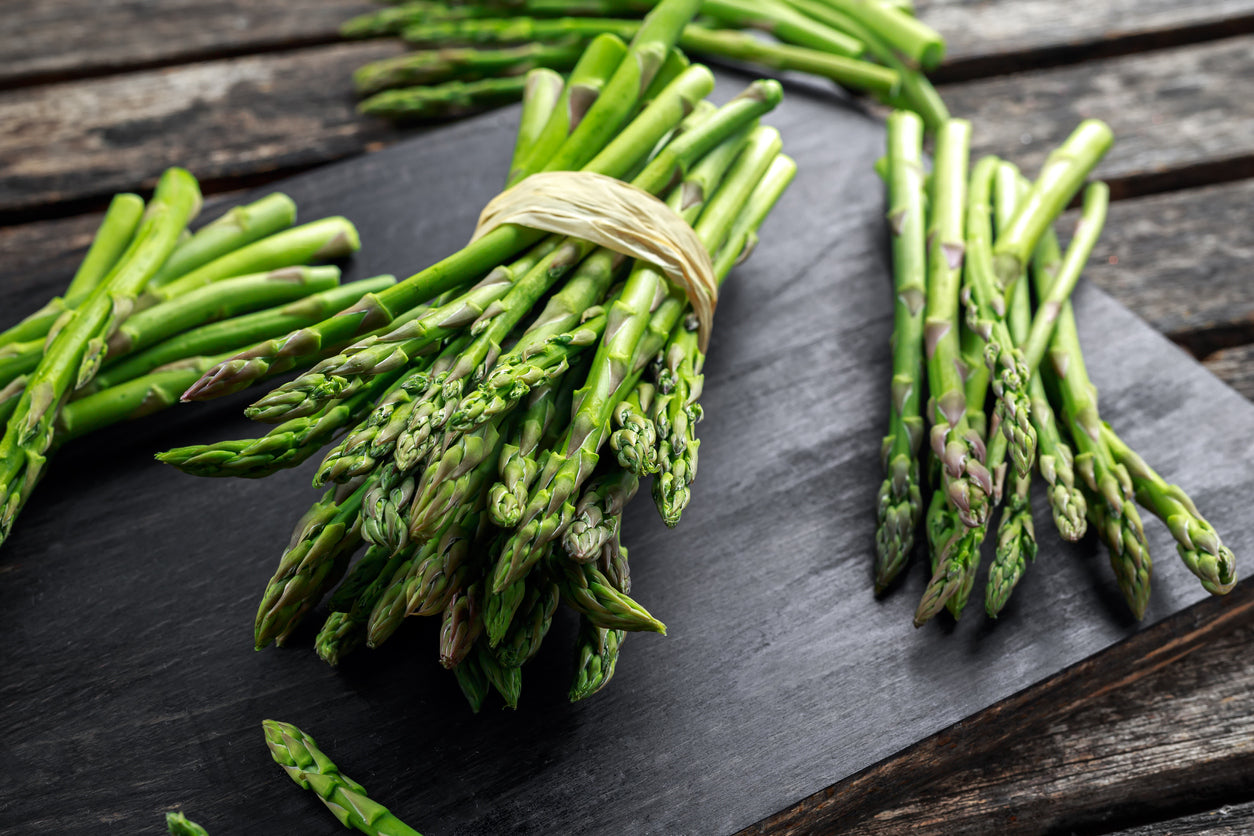3 surprising reasons to add asparagus to your diet

Even asparagus fans concede that this stalky, dusky-green vegetable has an odd, almost prehistoric appearance. Believe it or not, this strange-looking veggie is a member of the same plant family that brings us the exquisite flowering lily. But, for true aficionados, the flavor of asparagus spears - described as earthy, nutty, grassy, and delicate - more than justifies their homely silhouette.
Regarding health benefits, asparagus lovers are truly “ahead of the game.” This bona fide superfood is rich in vitamins, minerals, fiber, and antioxidants, giving it some serious disease-fighting and health-sustaining properties. Asparagus has been used millennia in Traditional Chinese and Korean Medicine to treat high blood pressure and urinary problems. Now, the rest of the world is catching on, with recent reviews suggesting that it may help protect against some of the deadliest diseases of our time.
Tender asparagus spears are “tough customers” when it comes to combating heart disease and cancer
Researchers have long maintained that molecules known as free radicals – or reactive oxygen species - can cause the oxidative damage contributing to cardiovascular problems. Fortunately, asparagus is an outstanding source of quercetin. Found in fruits and vegetables, this potent antioxidant flavonoid has been shown to reduce the risk of heart disease and decrease harmful LDL cholesterol. In addition to quercetin, the antioxidants glutathione, rutin, and kaempferol contribute to anti-oxidative activity.
Asparagus is also a good source of potassium - which helps lower elevated blood pressure, a primary risk factor for heart disease and stroke. And, when it comes to lowering blood pressure, asparagus has another trick up its sleeve. In a review published in 2020 in Metabolites, the authors credited asparagus with lowering blood pressure by up to 17 percent in animal studies - and added that it appeared to work like the pharmaceutical ACE inhibitors. Asparagus is also rich in folate, or vitamin B9. This important nutrient prevents the accumulation of homocysteine, an amino acid linked with heart disease.
And, heart disease is not the only potentially life-threatening disease that asparagus can help to prevent. It has also been credited with anti-tumor effects. Researchers report that asparagus contains asparagusic acid, a compound which inhibits production of cyclooxygenase 2 (COX-2), a molecule associated with inflammation and the growth of cancer cells.
Asparagus is a nutritional powerhouse
Regarding the content of vitamins and minerals, asparagus is a true “high-ringer.” A half-cup serving contains an impressive 57 percent of the recommended dietary intake of vitamin K. In addition to being indispensable for strong bones and normal blood clotting, vitamin K helps to fight atherosclerosis and heart disease by keeping calcium out of the blood and in the bones, where it belongs. There is also evidence that vitamin K works against diabetes by improving insulin sensitivity.
Another nutritional “plus” for asparagus is that a half-cup serving provides close to 20 percent of the RDI for vitamin A, which is essential for a healthy immune system. Antioxidant vitamin C, vitamin B9, iron, zinc and phosphorous round out the roll call of beneficial vitamins and minerals in asparagus. And, with a modest 20 calories per serving, asparagus won’t break the caloric “bank.”
Asparagus nourishes the gut microbiome
Every day, more evidence accumulates to support the importance of a balanced and diverse community of gut bacteria. Beneficial microorganisms are indispensable to a strong immune system and may even play a role in improving mood and cognition. In addition, they are vital to the production of essential nutrients such as vitamins B12 and K2.
It’s hard to think of a more beneficial food for gut bacteria than asparagus. A half-cup contains 1.8 grams of soluble and insoluble fiber, providing substantial health benefits. The soluble fiber in asparagus officially qualifies it as a “prebiotic” food – meaning that it directly nourishes gut bacteria, particularly beneficial strains such as Acidophilus and Lactobacillus.
The insoluble fiber in asparagus provides yet another service for the body. Insoluble fiber helps to promote digestion and speed the elimination of waste, thereby reducing the risk of colorectal cancer, heart disease, and type 2 diabetes.
Enjoy asparagus in many delicious ways
You can enjoy versatile asparagus steamed, boiled, roasted, sauteed or grilled. Add it to stir-fries, frittatas, pasta, and omelets, or enjoy the raw tips with hummus, lemon juice, or yogurt dip. When selecting asparagus, look for firm stalks – never soggy or limp – and intact, tightly bunched tips.
While the fiber in asparagus is undoubtedly good for you, the very ends of stalks can be overly fibrous, woody, and difficult to chew - and might represent a “little too much of a good thing.” A good rule of thumb is to cut the bottom ends off where the white turns to green – usually, about an inch or two should suffice.
When possible, natural health experts advise opting for purple asparagus. This variety is high in anthocyanins, disease-fighting plant pigments also found in blueberries, cherries, and grapes.
As for asparagus’ unusual ability to affect the odor of urine, this phenomenon has been well known for centuries – and has not escaped literary mention, including from such illustrious writers as Benjamin Franklin and Marcel Proust. (The odor, which originates from healthful sulphur compounds, is no cause for concern). Intriguingly, scientists point out that asparagus doesn’t have this effect on everyone, with asparagus eaters falling into two categories: “excreters” and “non-excreters.”
Whichever category you fall into, you can rest assured: asparagus is a valuable ally against disease, and an excellent addition to a healthy diet.
Sources for this article include:






